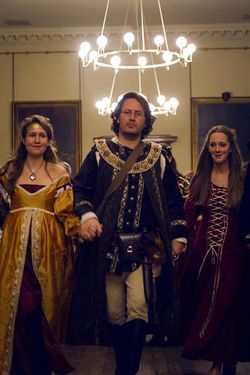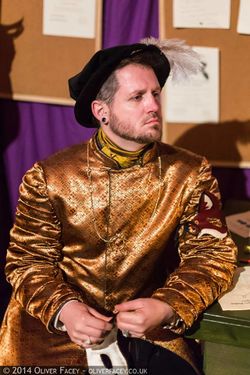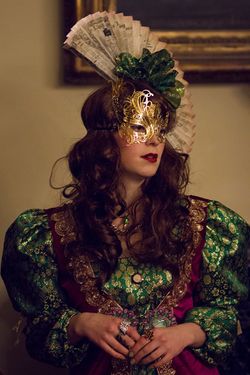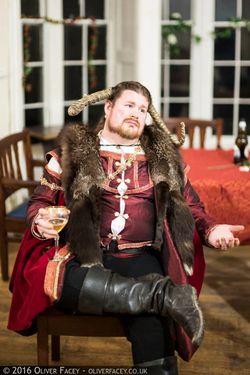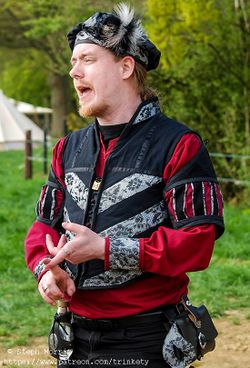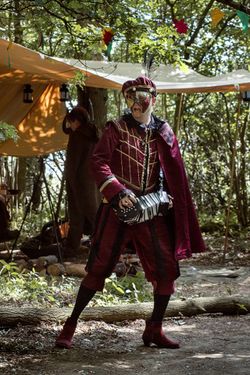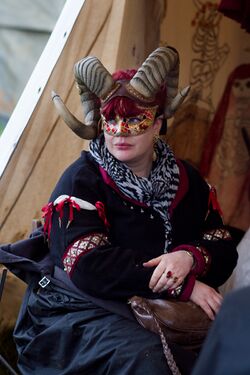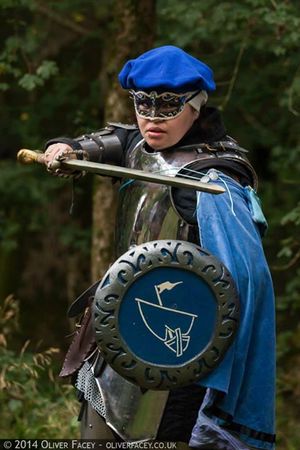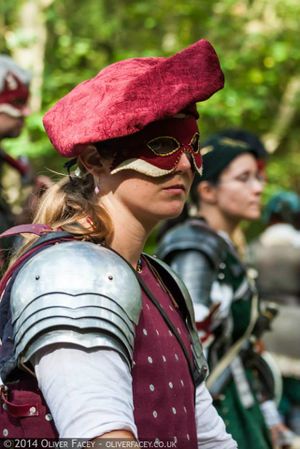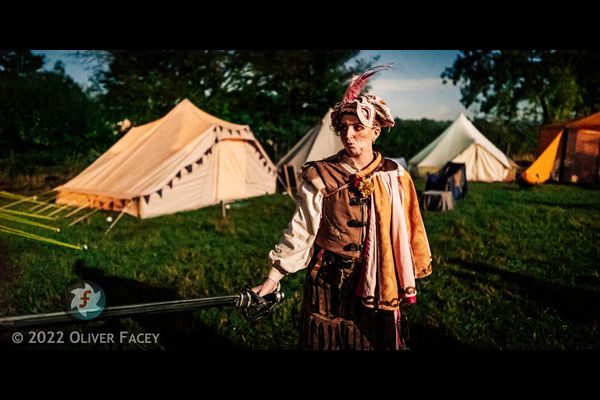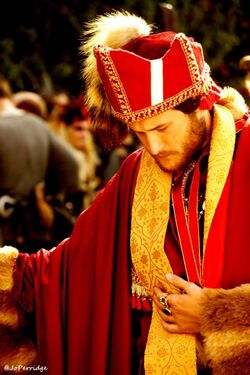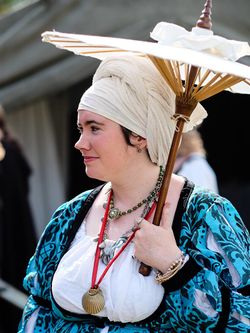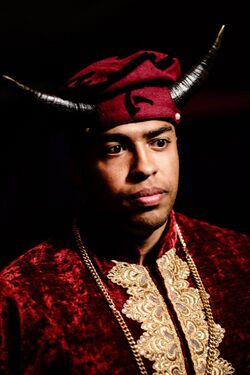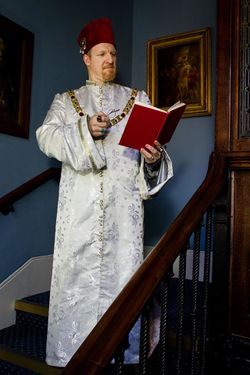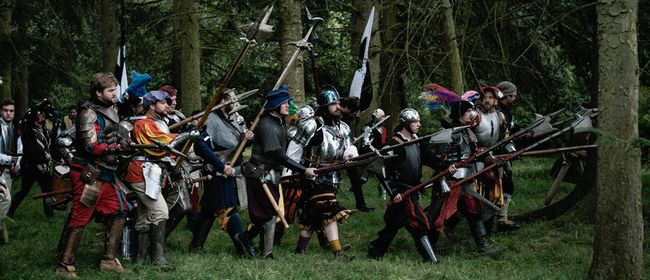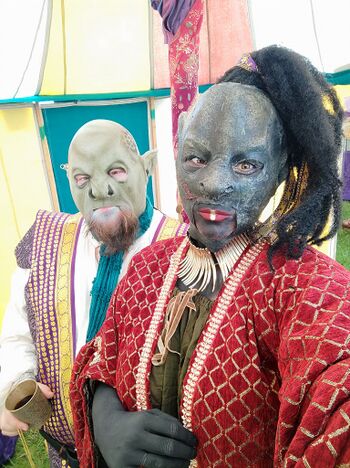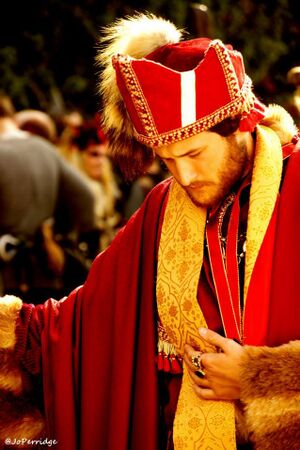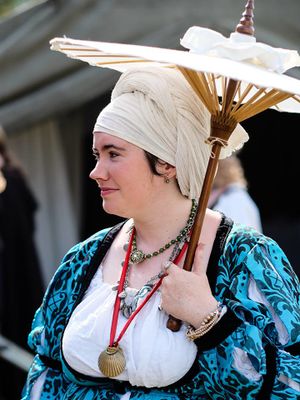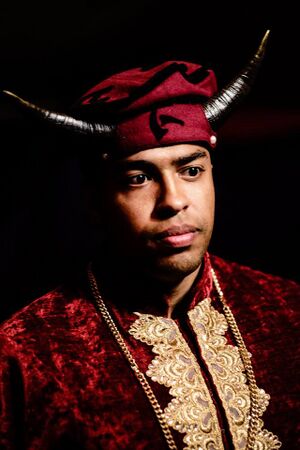The League look and feel
Overview
The League is urban. The influences come from the Italian city states, the Hanseatic league, and Prague, as well as classic fantasy cities. This is a nation ruled by powerful guilds, and while there are poor people the cities are well maintained and are very different to the shambolic chaos of a Port Blacksand or even a Lankhmar.
The League is rich. Fine fabrics showing the wealth and style of merchant-princes. Rich silks in the south and fur trim for the northern cities of Temeschwar and Holberg. It is opulent not ostentatious, a purposeful show of wealth and power.
Also see League costumes and icons and artistry.
Feel
Flamboyant, rich, urbane, ambitious, loyal, resplendent, flourish.
Breakdown
Influences
High medieval and renaissance luxury.
Materials
Velvet, Cotton, Silk, Fur Trim, Brocade, Damask, Jacquard
Colours
The palette is rich and autumnal. Wine reds, golden yellows, supported by rich oranges and deep blues and blacks.
Clothing
In the south, short doublets of richly patterned silks are cut to flatter. Sleeves are either tight with the undershirt puffing from beneath or occasionally full, and the effect is somewhat top-heavy, with trousers cut to a slender leg. Slashing is the height of fashion, particularly amongst the military whose taste verges on the gaudy.
In the north the climate is colder, and clothing reflects that. More fur trim, more layers. Perhaps a long sleeveless gown of velvet over the fashionable doublet, which might be made of leather not silk.
Ladies who do not favour doublet-and-trousers wear elaborate high-waisted gowns. The neckline may be lower than in other nations, cut almost to the waistband. An undergown, chemise or kirtle, often of a contrasting colour, is usually visible at the front. A fashionable gown from the northern cities would be long and full, sleeved and high-waisted. To the south, the gown might be sleeveless, or with sleeves slashed like a doublet’s. Ribbons are often used as decoration.
Armour
Armour is usually worn to allow the brightly covered clothing beneath to show through. A full harness is rarely worn, and heavy armour is usually concentrated over the vital areas, particularly the chest and head.
Those Free Companies that can afford it purchase matching armour. Those that must make use of what they can salvage combine it with matching costume to ensure that their group is identifiable as a single unit.
A starting Free Company may equip its members with a bright uniform in two contrasting colours and a quilted jack. Wealthier companies may have matching arming doublets, armour and helmets.
Weapons
Professional soldiers tend to prefer crossbows, long spears or halberds. Street fighters usually favour a light sword with a main gauche or stiletto for the off-hand. Shields are not common in either case.
Costume
League costume is beautifully tailored with layers of complex cutting and decoration. Gowns are high waisted and may have low necklines, with complicated detailing such as puffed or slashed sleeves.
Doublets are constructed with similarly complex decoration; sleeves are often laced on to the body of the doublet. The look is generally rather top heavy with slim fitting trousers or breeches and high legged boots.
Bravos
A bravo is usually light armoured if at all. They usually wield a rapier, sometimes paired with a short parrying dagger like a main gauche. Many bravos are part of a free company.
Bishops
Bishops are priests who involve themselves in the complex politics of the League. They are often wealthy, and dress to demonstrate their wealth and spiritual authority to others. Bold colours and rich fabrics are common, but the clothing is usually cut to leave an onlooker in no doubt that the person they are looking at is a priest of the Way. Exotic appearing hats and other headgear are extremely common.
Free companies
The riotously bright uniforms of the free companies mostly comprise two colours, with sleeves and trousers in the main colour, slashed to let the contrasting colour show through. A steel breastplate and helm provides the basic armour.
Spiral and the Orcs
The Apulian Orcs who have joined the League have adoped the fashion of the League with an assured confidence, so all the regular League costume guidance is still relevant. To make a more distinctly Apulian costume, remember that many residents of the territory retain a fondness for bright colours, especially rich purples and wine reds adorned heavily with gold trims, with vibrant oranges often being used as an accessory. Silk is popular; the sumptuous fabric makes for a clear demonstration of the wealth of the wearer and harkens back to the traditional dress of the Broken Shore. The majority of Apulians have embraced the wealth of fabrics readily available in their new nation; wool, velvet, and brocade are all proving popular and serving as excellent compliments to the traditional silk of the Grendel. As always, the goal is that clothing should demonstrate the wealth of the wearer.
If you are playing a League Orc, then gloves are practical, the easiest way to avoid having to constantly repaint your hands. That approach makes rings on your fingers less practical, so Apulian orcs are experimenting with different approaches. If you have fine gloves you might be able to wear a bigger ring over them, but you can also wear a ring on a ribbon around the neck or hanging off the belt. When wearing a Mask most Apulians are adopting something made using soft cloth and loosely tied or else using something rigid which can be held in front of the face with a stick.
An important thing to think about is how to hide the joins where your mask and gloves meet your skin. Plenty of gold jewellery, the gaudier the better, is the ideal. Pieces like chokers or bracelets can be used to demonstrate wealth at the same time as keeping the joins hidden. An alternative accessory is an infinity scarf, worn up or down, and that can be adorned with garish jewellery to again make an audacious demonstration of wealth. A ruff is less appropriate, as they are highly evocative of a later period than the ideal for League costume.
Banners
An iconic impressive banner makes a bold statement for any free company.
Theatre and masks
The tradition of masked theatre runs strong in League cities, where it is an important constituent of the magic of a performance. Facemasks are also a common element of fashionable attire for individuals from all walks of life.
This custom sprang partly from the popular Facio style of masked theatre, where actors and even audience members swap characters as they swap masks, and partly descends from the traditions of cowls and veils in Highguard society. Masks allow an individual to cultivate anonymity and the air of mystery. Some groups – military units and criminals especially – may go so far as to all wear matching masks even in dangerous situations.
Churches
The heavily decorated robes of The League priests are in sharp contrast to some of the ascetics of other nations. Lavish embroidery, metallic threads and elaborate headdresses are all used to communicate their importance.
Further Reading
Core Brief
Additional Information

